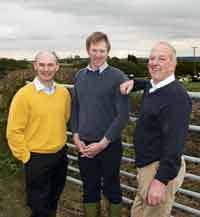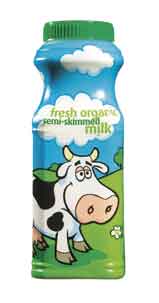Organic milk for McDonald’s at the Olympics

Organic milk from the Dilks family’s two Derbyshire herds supplies McDonald’s restaurants for use in tea, coffee and bottled milk.
The firm began using organic milk several years ago and consumption has grown 22% in the past two years so that now almost 17m of its 49m litres annual milk purchases are organic.
The chain’s Olympic involvement will bring further growth as it gears up to provide 20% of the food and drink at the London games in 2012.
Milk from Lawn Farm and White House Farm travels to Arla’s Ashby de la Zouch dairy in Leicestershire, fetching Arla’s standard organic price of 32.5p/litre, plus a quality bonus which in the case of both farms is 0.5p/litre.
Commitment
While there is no direct price premium attached to supplying McDonald’s, Bill Dilks values the firm’s commitment to organic milk and the scale of the demand which this brings.
He has been supplying Arla as a member of the Arla Foods Milk Partnership for seven years and began organic conversion about five years ago in a bid to secure better prices and to cut costs. He was the first organic producer to sign up with Arla.
“I’ve no regrets about going organic, it’s proved to be the right decision,” said Mr Dilks. “We could not have continued to produce milk at the price we were getting before. I’m very happy with the system and it has brought wildlife and sporting benefits. Productivity has dropped but not as much as we expected.”
As long as farms meet the assurance and organic standards of the Soil Association or of Organic Farmers and Growers and have Assured Dairy Farms status there is no additional assurance requirement by McDonald’s.
The Dilks family also opened Lawn Farm for a day in October as part of the McDonald’s Open Farms initiative to showcase farm level production of its food to local customers and others. At the open day UK head of purchasing and quality assurance Michele Banik-Rake, said that 50% of its customers would like to buy local.
Open farms are being used to make the link between farm and restaurant counter, with some of them, including Lawn Farm, already featuring in TV adverts as part of the Olympic campaign.
“We will be involved right up to the Olympics, telling the public that McDonald’s is supplying good food,” said Mr Dilks.
“A lot of people will gain from the Olympics and it’s good to know that farmers will be getting some benefit too.”
Closer links
Arla and McDonald’s forged closer links 18 months ago and now the processor is the chain’s sole supplier for the vast majority of its fresh milk, said Nic Parsons, agricultural manager for Arla. McDonald’s is Arla’s second largest customer for organic milk.
 Key to its requirements are traceability and assurance. Throughout its sourcing of UK and Irish produce McDonald’s relies on existing assurance schemes such as the Assured Dairy Farm Scheme, Red Tractor ABM, the Beef Labelling Scheme, organic certification, the British Egg Industry Council’s Lion Code and RSPCA Freedom Food.
Key to its requirements are traceability and assurance. Throughout its sourcing of UK and Irish produce McDonald’s relies on existing assurance schemes such as the Assured Dairy Farm Scheme, Red Tractor ABM, the Beef Labelling Scheme, organic certification, the British Egg Industry Council’s Lion Code and RSPCA Freedom Food.
Overarching these schemes is the McDonald’s’ Agricultural Assurance Programme, established in 2001, which drives improvement and aims to achieve consistency through the European supply chain, where more than 300 separate assurance schemes operate.
Agricultural products
MAAP covers core agricultural products such as beef, chicken, eggs, milk, cheese, potatoes, wheat, lettuce, tomatoes and cucumber and monitors environmental management, good agricultural practice, animal health and welfare, transparency and genetics. Suppliers are encouraged to continually explore advances in animal rearing and husbandry.
In another project, McDonald’s is partnered with rural consultancy and energy auditing company E-CO2 to measure carbon emissions from 350 beef farms to find the best model for reducing energy consumption. Farms are audited year-on-year, with results and advice on potential savings to meet climate change targets expected in mid-2011.
As well as using assurance and MAAP to monitor how its supplies are produced, McDonald’s is also keen for suppliers to check on how it performs.
Several farmers, including Farmers Weekly Farmer of the Year John Hoskin have been appointed Scout with Clout, checking behind the scenes at abattoirs, cutting and processing plants, while suppliers of other goods go to McDonald’s’ premises to check how their own products supplied there are being treated and used.
Olympics showcase
Linking consumers and food producers is part of an ongoing process which has been ramped up by the approach of the Olympic Games, the firstÊgames to have a sustainable sourcing policy and the aim of leaving a food legacy.
McDonald’s served 500,000 meals at the last Olympics in Beijing and aims to supply 20% of Olympic food in London in 2012, where 14m meals are expected to be served over a four-week period.
The Olympics will be a huge showcase for UK produce, as the organising committee has committed to delivering a tastier, healthier, greener games. The games’ food charter encourages caterers and others to commit to supporting and implementing local, seasonal, healthier and sustainable standards across the industry. This also draws on assurance using existing certification schemes.
